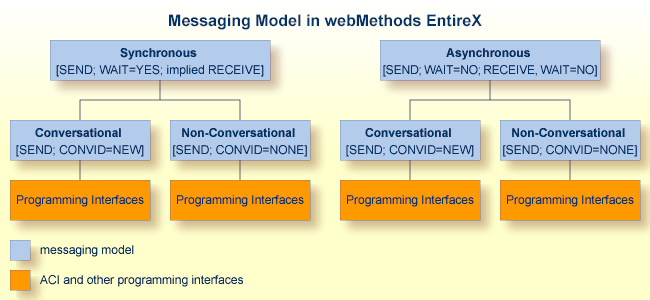This document covers the following topics:
Note:
After viewing this document, see the document
Common Use Cases, which supplies specific business examples of the
interoperability available through EntireX Broker.
This section introduces the basic concept of EntireX Broker: achieving highly flexible interoperability of application components in a distributed processing environment. This concept is described from the perspectives of
a messaging model
communication models
application programming interfaces
EntireX components
in order to give you a comprehensive, high-level view of how EntireX Broker enables flexible interoperability between distributed application components.
In a distributed processing environment that uses EntireX Broker,
communication occurs through application components exchanging messages. An
application component offering a service registers
it with EntireX Broker (see REGISTER); this makes the service available to other application
components able to communicate with EntireX Broker. An application component
intending to access a service issues its request through EntireX Broker, which
then routes the request to the specific application component offering the
service.
The following concepts help describe how message exchange is structured in EntireX Broker:
Synchronicity
The application initiating the request either waits for the result
to return, whereby it suspends all processing (synchronous); or it does not
wait for the result to return, whereby it is freed to do other processing
(asynchronous).
Conversationality
The request can either be a single pair of messages comprising
request/reply (non-conversational); or it can be a sequence of multiple
messages which are all part of the same request (conversational).
The following diagram shows the two major concepts of EntireX Broker's messaging model: synchronicity and conversationality. See ACI Syntax of Messaging Model below for a description of the messaging syntax.

The table below describes the messaging terms mentioned in the diagram above from the viewpoint of the application component initiating the request, as expressed in ACI syntax.
The ACI (Advanced Communication Interface) is the lowest level application programming interface that interacts with EntireX Broker. The ACI is common to all of the messaging models and communication models (see Communication Models and Interoperability) of EntireX.
| Messaging Term | Client | Server | |
|---|---|---|---|
|
|
Synchronous | ||
| Asynchronous (2) | |||
|
|
Conversational (2) | ||
| Non-conversational (2) | |||
Notes:
SEND, WAIT=YES command contains an implied RECEIVE command.
The EntireX Broker uses the communication model client-and-server. This model is based on the connection between exactly two partners: client and server. This model covers the requirements of conversational communication and asynchronous processing.
